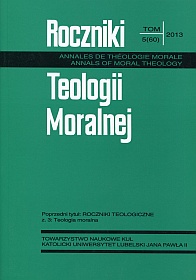Transhumanism versus Christian Theology and Ethics
Abstract
Contemporary transformation and disintegration of man is manifested in many ways. One of the most compelling is transhumanism understood as a philosophy (ideology) based on a conviction that man can be enhanced using technological means. It is the modem progress of science and technology, particularly biotechnology, that for transhumanists makes the pursuit for human enhancement necessary. Thus, human beings are perceived as a transitional species in human history leading to the posthuman future when posthumans will become resistant to disease, to aging etc. From the Christian theological perspective transhumanism is criticized as a project entirely secular, promising a happy life and "ageless bodies” on earth. Not fewer criticisms come from the ethical perspective. In the posthuman world ethics seems to be entirely relativized and even disintegrated due to its subordination to utilitarianism and eugenic purposes. What is particularly troubling is the idea that "the genetically enhanced will take advantage of the unenhanced”. The whole transhumanist ideology is the concept in which the giftedness of human life is fundamentally denied and man aspires to be self-sufficient and in control of his future. Transcendence is entirely rejected and replaced by biotechnological future.
References
Benedykt XVI. Encyklika Caritas in veritate. Watykan: LEV 2009.
Kongregacja Nauki Wiary. Instrukcja dotycząca niektórych problemów bioetycznych Dignitas personae. Watykan: LEV 2008.
Bishop J. P.: Transhumanism, Metaphysics and the Posthuman God. „Journal of Medicine and Philosophy” 35:2010 s. 700-720.
Bostrom N.: The Transhumanist FAQ. Oxford: World Transhumanist Association 2003.
Brugger E. Ch.: Introduction to Transhumanism: Attempting to Make a New Type of Person. W: www.zenit.org [dostęp: 21.04.2010].
Brugger E. Ch.: Transhumanism (2012). W: www.zenit.org [dostęp: 7.03.2012].
Campbell N., O'Driscoll A., Saren M.: The Posthuman: The End and the Beginning of the Human. „Journal of Consumer Behaviour” 9:2010 nr 2 s. 86-101.
Cole - Turner R.: Introduction: The Transhumanist Challenge. W: Transhumanism and Transcendence: Christian Hope in an Age of Technological Enhancement. Red. R. Cole-Turner. Washington D.C.: Georgetown University Press 2011 s. 1-18.
Deane - Drummond C.: Taking Leave of the Animal? The Theological and Ethical Implications of Transhuman Projects. W: Transhumanism and Transcendence s. 115-130.
DeGrazia D.: Enhancement Technologies and Human Identity. „Journal of Medicine and Philosophy” 30:2005 nr 3 s. 261-283.
Fukuyama F.: Transhumanism. „Foreign Policy” 2004 nr 144 s. 42-43.
Harris J.: Enhancing Evolution: The Ethical Case for Making Better People. Princeton, N.J.: Princeton University Press 2007.
Is Human Nature Obsolete? Genetics Bioengineering and the Future of Human Condition. Red. H. W. Baillie, T. K. Casey. Cambridge, Mass.: MIT Press 2005.
Kass L. R.: Ageless Bodies, Happy Souls. „The New Atlantis. A Journal of Technology and Society” 1:2003 nr 1 s. 9-28.
Kass L. R.: Beyond Therapy: Biotechnology and the Pursuit of Human Improvement (2003). W: www.bioethics.georgetown.edu [dostęp: 20.06.2013].
Koch T.: Enhancing Who? Enhancing What? Ethics, Bioethics, and Transhumanism. „Journal of Medicine and Philosophy” 35:2010 s. 685-699.
McKenny G.: Transcendence, Technological Enhancement and Christian Theology. W: Transhumanism and Transcendence s. 177-192.
Mehlman M. J.: Price of Perfection: Individualism and Society in the Era of Biomedical Enhancement. Baltimore: John Hopkins University Press 2009.
Mitchell C. B. [i in.]: Biotechnology and the Human Good. Washington D.C.: Georgetown University Press 2007.
More M.: The Extropian Principles 3.0. W: www.maxmore.com [dostęp: 19.06.2013].
Peters T.: Progress and Provolution: Will Transhumanism Leave Sin Behind? W: Transhumanism and Transcendence s. 64-86.
Sandel M. J.: The Case against Perfection: What’s Wrong with Designer Children, Bionic Athletes and Genetic Engineering. „The Atlantic Monthly” 293:2004 nr 3 s. 50-62.
Savulescu J.: Procreative Beneficence: Why We Should Select the Best Children. „Bioethics” 15:2001 nr 5-6 s. 413-426.
Thacker E.: Data Made Flesh: Biotechnology and the Discourse of the Posthuman. „Cultural Critique” 2003 nr 53 s. 72-97.
Tirosh - Samuelson H.: Transhumanism as a Secularist Faith. „Zygon: Journal of Religion and Science” 47:2012 nr 4 s. 710-734.
Transhumanism and Transcendence: Christian Hope in an Age of Technological Enhancement. Red. R. Cole-Turner. Washington D.C.: Georgetown University Press 2011.
W poszukiwaniu człowieka w człowieku. Chrześcijańskie korzenie nadziei. Red. S. Nowosad. A. Eckmann, T. Adamczyk. Lublin: Wyd. TN KUL 2012.
Waters B.: From Human to Posthuman: Christian Theology and Technology in a Postmodern World. Aldershot: Ashgate 2006.
Waters B.: Whose Salvation? Which Eschatology? Transhumanism and Christianity as Contending Salvific Religions. W: Transhumanism and Transcendence s. 163-175.
Weigel G.: Ocalić Gaudium et spes. Nowy humanizm Jana Pawła II. „Ethos” 25:2012 nr4 s. 52-69.

